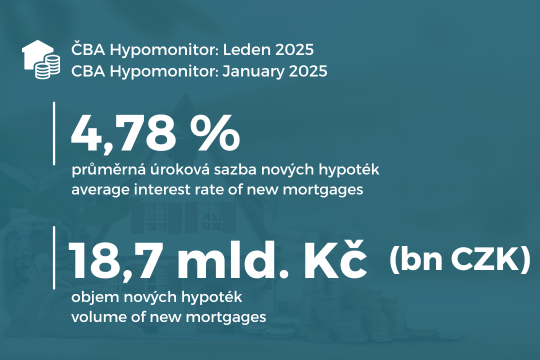CBA Hypomonitor: New mortgages did not loosen with the new year

Still strong January mortgage origination volume despite seasonal decline
"The behaviour of households shows how they are following developments in the property market. House and apartment prices accelerated last year, which, with a limited supply of new projects, may continue in 2025. Clients are speeding up their decisions on new homes, as hesitating to buy may become more expensive in the coming months.Therefore, even in the usually weaker January, interest in mortgages continued and sales volumes were decent," says Martin Vašek, CEO and Chairman of the Board of Directors of ČSOB Hypoteční banka.
"Although January traditionally brings a larger seasonal decline in the volume of new mortgages, this year is certainly not the case and we see a promising start to the new mortgage year. The average interest rate has fallen slightly to 4.78%, while the average amount of new mortgage originations continues to rise. Based on the current figures, the first quarter could bring a significant recovery of the market, as people are starting to deal more intensively with the issue of owning their own home and a slight drop in rates may support their decision-making," says Zdeňka Kovářová, Mortgage and Consumer Finance Manager.
Table 1: Summary of mortgage origination volumes and average interest rates for January 2025
|
|
Volume |
Number |
Rate |
|
|
|||
|
Total |
22,6 |
5 957 |
4,77 |
|
New loans |
18,7 |
4 764 |
4,78 |
|
of which: |
|
|
|
|
for purchase |
15,3 |
3 849 |
4,77 |
|
for construction |
2,7 |
649 |
4,73 |
|
Other |
0,8 |
266 |
4,99 |
|
Refinanced from another institution |
3,2 |
979 |
4,71 |
|
Refinanced internally |
0,7 |
214 |
4,80 |
|
Source: CBA Hypomonitor |
|
|
|
The average mortgage rate continues its downward trend
Chart 1: Average mortgage rate - new business
"The fall in the interest rate has a positive impact on the household budget, but this only partially offsets the impact of the increase in the average mortgage amount, about two-thirds.The overall impact on the net income of the applicant is thus about minus one percent," adds Jaromír Šindel, chief economist at the Czech Banking Association.
Average mortgage size rose further in January due to construction loans
Chart 2: Average amount of new mortgages actually granted by purpose
Impact on the average instalment
Table 2: Average monthly mortgage payment by length of repayment and interest rate
|
Average size of new mortgage in CZK: |
|
|
3 924 901 |
||||
|
Average interest rate in %: |
|
2,0 |
3,0 |
4,0 |
4,78 |
5,0 |
6,0 |
|
|
|
|
|
Monthly instalment: |
|||
|
Mortgage maturity in years: |
15 |
25 257 |
27 105 |
29 032 |
30 587 |
31 038 |
33 121 |
|
20 |
19 855 |
21 767 |
23 784 |
25 425 |
25 903 |
28 119 |
|
|
25 |
16 636 |
18 612 |
20 717 |
22 441 |
22 945 |
25 288 |
|
|
|
30 |
14 507 |
16 548 |
18 738 |
20 541 |
21 070 |
23 532 |
|
Source: CBA [2] |
|||||||
|
Note: The coloured column corresponds to the interest rate of the latest CBA Hypomonitor, other rates are illustrative |
|||||||
[2] The table is available in the xls file attached on the CBA Hypomonitor website
Mortgage market in 2024: record growth of 83%
Chart 2: Annual volume and number of mortgages granted from 2021 to 2024
CBA publishes summary statistics for the entire banking market
- Purchase of real estate
- Property construction - including property renovation
- Other new arrangements - only new loans that are in no way related to the purchase or construction of the property, e.g. so-called American mortgages, settlement of a JVM, repayment of the purchase price, settlement of an inheritance share, settlement of a cooperative share, etc.
- an increase in the agreed amount
- changes such that the original loan has been refinanced/converted into a new loan within the reporting entity. This is a genuinely new contract and not, for example, just a new arrangement in the context of a refixation of an existing contract. Therefore, the volume of such loans in the CBA statistics is lower than 'other new arrangements' in the Czech National Bank statistics.